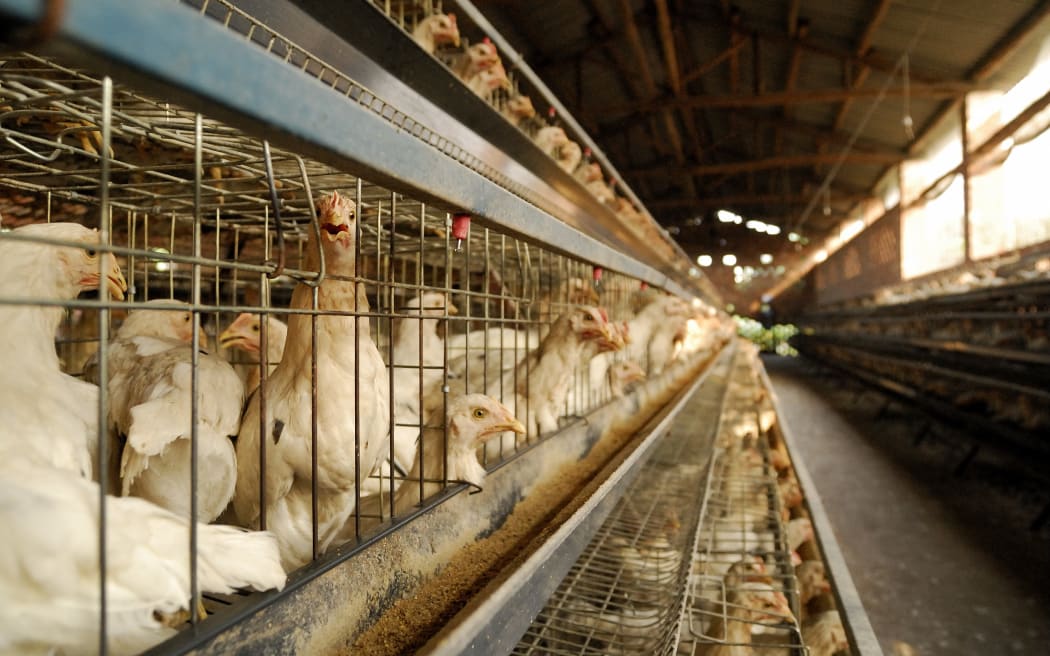
Over 80 percent of liquid egg imports in 2022 come from China and Australia where egg-laying hens can be kept in battery cages. New Zealand’s ban comes into force in 2023.
Photo: Biosphoto via AFP
A significant amount of imported animal products are produced using methods that are illegal in New Zealand, a new report has been found.
It was revealed the country imports liquid eggs from hens raised in battery cages, pork from pigs kept in cramped crates, and wool from sheep subjected to ‘mulesing’ – cutting chunks of flesh from their hindquarters to prevent flystrike.
All of those practices are prohibited in Aotearoa due to animal welfare concerns.
The report, launched by the SPCA, Animal Policy International and the New Zealand Animal Law Association, called on the government to extend animal protection laws to cover all products in the New Zealand market, regardless of their origin.
SPCA chief scientific officer Arnja Dale said the findings were extremely concerning.
“Overseas animals are being kept in conditions that New Zealanders have already clearly rejected, and yet products from those conditions continue to be sold to New Zealand consumers,” she said.
“The new government has an opportunity to close the welfare gap by extending animal welfare regulations to imports.”
Animal Policy International co-executive director Rainer Kravets said New Zealand was undermining the standards the country’s own farmers were held to.
“Allowing imports with lower welfare standards creates a race to the bottom that sells out New Zealand values and farmers.
“Just as we regulate imports to safeguard our biosecurity, we should also do so for animal welfare, protecting the values of New Zealanders and upholding our reputation.”
The report’s authors also warned future free trade agreements could further open New Zealand’s market for low-welfare imports.
The minister responsible for animal welfare, Associate Agriculture Minister Andrew Hoggard, was not on board with the idea to extend New Zealand laws to imported goods.
“New Zealand’s longstanding position is that animal welfare standards are dependent on each country’s domestic context and that imports should not be restricted on the basis of method of production,” Hoggard said.
To do so would put New Zealand “out of step” with other countries and could impact the export sector, he said.
Instead, Hoggard cited other efforts to improve animal welfare standards internationally – such as Aotearoa’s membership of the World Organization for Animal Health, and Free Trade Agreements with the United Kingdom and the European Union.
Both agreements “contain animal welfare chapters recognizing that while our farming practices are different, our respective animal welfare standards and associated systems provide comparable animal welfare outcomes,” he said.
The report found:
- Over 90 percent of pork comes from countries that allow sow stalls and farrowing crates. New Zealand banned sow stalls in 2016, and the government has passed regulations phasing out farrowing crates by 2025.
- All of the wool imported in 2022 came from Australia where mulesing remains common. In New Zealand performing mulesing can result in a criminal conviction.
- Over 80 percent of liquid egg imports in 2022 come from China and Australia where egg-laying hens can be kept in battery cages. New Zealand’s ban came into force in 2023.
- Over 70 percent of imported fish comes from Thailand, China, Australia, and Vietnam – countries with no welfare standards around slaughter. New Zealand has a Code of Welfare that concerns aquatic animals at the time of slaughter.